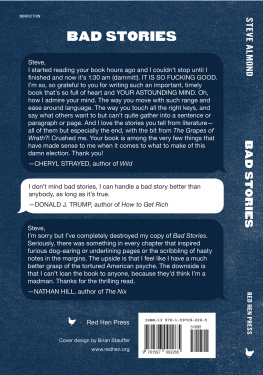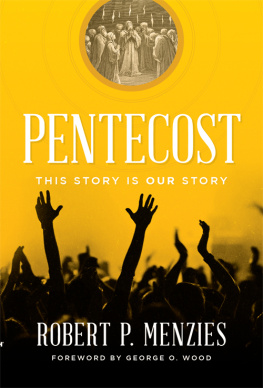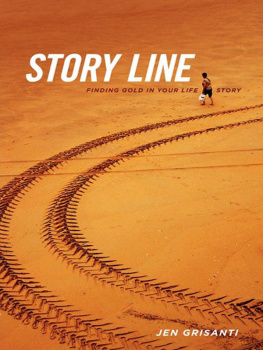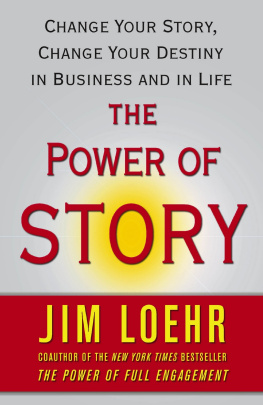


Bad Stories: What the Hell Just Happened to Our Country
Copyright 2018 by Steve Almond
All Rights Reserved
No part of this book may be used or reproduced in any manner whatsoever without the prior written permission of both the publisher and the copyright owner.
This is a work of non-fiction, which is to say: a radically subjective version of events that objectively took place. Ive changed a few names and identifying characteristics.
Book design by Mark E. Cull
Library of Congress Cataloging in Publication Control Number: 2017043371 (print)
ISBN: 978-1-59709-226-5
eISBN: 978-1-59709-223-4
The National Endowment for the Arts, the Los Angeles County Arts Commission, the Dwight Stuart Youth Fund, the Max Factor Family Foundation, the Pasadena Tournament of Roses Foundation, the Pasadena Arts & Culture Commission and the City of Pasadena Cultural Affairs Division, the City of Los Angeles Department of Cultural Affairs, the Audrey & Sydney Irmas Charitable Foundation, Sony Pictures Entertainment, Amazon Literary Partnership partially support Red Hen Press.

First Edition
Published by Red Hen Press
www.redhen.org
For Josie, Jude and Rosalie
my storymakers, my loves
CONTENTS
BAD STORIES
Do you remember on the first page of dinner, mama?
The first page of dinner?
Didnt you know? Were all in a really long story.
Rosalie Almond, age 3
Do you see the story? Do you see anything?
It seems to me I am trying to tell you a dream
Joseph Conrad
I cant claim to have lived through Watergate; I was all of five when it began. I only knew that something bad had happened in the adult world, that the president was in trouble and that his trouble seemed to grow worse with the appearance of the newspaper each morning.
I do remember watching Nixon resign, though. This would have been August of 1974. We were vacationing in Mendocino, on the north coast of California, where our family had spent the previous summer living, rather precariously, on a commune called The Land. A friend from The Land, the magnificently named Oak Sawyer, was visiting us when word arrived that Nixon was going to deliver a live address to the nation. Our little rental didnt have a TV, so Oak called a neighbor of his and everyone trooped over to this neat, middle-class home to watch the president say what he had to say.
It was the sort of impromptu viewing party that would be hard to imagine today. My parents and Oak were basically hippies. My brothers and I had hair down to our shoulders. Our host was a crew-cut gentleman who announced, rather gallantly, that he had voted for Nixon and regretted it.
The president appeared on screen, seated behind a desk in a dark suit. He read carefully from a stack of papers clutched before him, like a mortician droning out burial options. Here come the tears, someone said.
Then, from the back of the room, I heard our mother say this: They finally got the bastard.
Im sure I was struck by her profanity. But what has stayed with me all these years is her tone. Beneath the contempt was a slender but distinct note of wonder. Someone (they) had done the impossible (finally got the bastard). It would take me several more years to put the pieces together.

By junior high, I had seen All the Presidents Men in the theater, and dog-eared the paperback. I knew the Hollywood version of Watergate by heart, how a pair of intrepid reporters, using little more than coffee, typewriters, and the indomitable power of the free press, had brought down a corrupt president.
Its hard to explain to those who werent alive in those years the holy glow that emanated from the word journalist. I spent fifteen years chasing that glowas the editor of my high school and college papers, a slavish summer intern, and finally a full-time reporter.
But as Ive grown older, and been relieved of various delusions about myself and our Fourth Estate, I am less dazzled by the specter of Woodward and Bernstein gum footing around Washington. What strikes me as the heart of Watergate is the public distress occasioned by the revelation that a president and his men would abuse their power. As evidence emerged of their corruption, citizens of all political persuasions, including our host in Mendocino, felt betrayed.
This sense of betrayal is what drove journalistic outlets to devote resources to the story, what led Congressional committees to launch inquiries, what spurred loyal aides to expose the presidents deceits, what compelled the Supreme Court to order Nixon to release the Oval Office tapes that incriminated him, and what finally convinced Republicans in Congress to draw up Articles of Impeachment. A moral consensus emerged that truth and justice transcended partisanship. Our civic and political institutions upheld this standard.
The story of Watergate, then, wasnt ultimately about one mans debased behavior. It was about a nations shared idealism.
The scandal led to a raft of reforms, intended to curb abuses of power and limit the influence of wealthy individuals, corporations, and lobbyists in political life. These measures have long enjoyed broad public support. By 2016, nearly all had been overturned in court, or allowed to lapse.

The origins of Watergate reside in a simple burglary. Five men were arrested in the middle of the night for trying to bug the offices of the Democratic National Committee. When reporters learned of the arrests, they asked two questions: who had hired the burglars, and why? The dogged pursuit of these questions led to the exposure of a criminal espionage operation run out of the Oval Office.
In the early months of the 2016 campaign, burglars again broke into DNC headquarters. They too were looking for dirt that would help elect the Republican candidate. This time, the burglars were Russian hackers. And journalists were oddly unconcerned with who had hired them or why. Instead, they eagerly publicized every scrap of damning material made available to them.
These efforts were compounded by a slew of lurid and slanderous stories disseminated by Russian operatives and bots. The result was a potent smear campaign against the Democratic candidate, one engineered by the Kremlin, applauded (and perhaps abetted) by her Republican opponent, and carried out, in large measure, by our free press.
The burglary, in this case, led not to the resignation of a sitting president, but the election of a man widely regarded as ethically and mentally unfit for office, even by many of those who voted for him.

This book originally carried a different (and rather more grandiose) subtitle:
Next page














